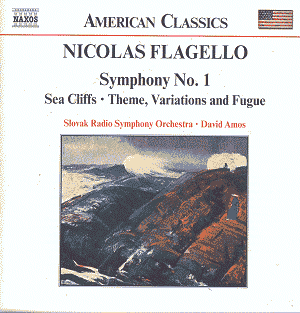It is a matter of wonder - amazement really -
that work of such super-heated romantic temperament could have
been written in the heart of the heartless 1960s. Flagello will
be known to you if you are familiar with earlier reviews on this
site. Suffice to say that he is of that 1930s American Italian
generation that also gave us Vittorio Rieti, Paul Creston and
Vittorio Giannini - romantics every one. Giannini in particular
is in urgent need of a major orchestral recording project starting
with Psalm 130 (cello or double bass and orchestra) and symphony
No. 4 as well as The Medead, a four-movement monodrama
for soprano and orchestra.
The Symphony is the first of two. The second,
for windband, is on Citadel (also reviewed here). This version
with David Amos as the practised hand and inspirer lacks the volcanic
though rough and ready blaze of the premiere with the Manhattan
School of Music Orchestra conducted by the composer from which
I have known the work since about 1985. It is however a far better
than creditable performance revealing a work that in its approach
can be said to lie somewhere between the stormy, resentful Tropics
of the First Symphonies of Alwyn and Rawsthorne. Even the merry-go-round
allegretto brusco has a psychologically hunted quality.
This, in general, is a work that touches none of the music of
Hanson or Piston or Schuman. Flagello is his own man. His romantic
soul is most clearly adumbrated by the finale with its generous
horn overlay and gloriously contrasted cliff-edge dynamics.
Sea Cliffs: Well these cliffs are not storm-pummelled.
They are a vantage point from which to view the murmurous dazzling
ocean miles. This is high class light music - a true genre piece
like the similarly neglected Sea Sheen by British composer,
Eric Fogg. The theme can loosely be grouped with the poetic melody
in the middle movement of Hanson's Second Symphony mixed with
elements from Hugo Friedhofer's The Best Years of Our Lives
(the titles) and something of Barber's Adagio. This
is a most lovely piece but then similar things can be said of
the Intermezzo from his opera The Pied Piper of Hamelin
- peaceful yet not bland, reflective yet not cloying, moving
yet not treacly.
Walter Simmons mentions the astringency of the
Symphony. I know what he means but it is the merest dusting. Similarly
light is the dissonance in the Theme, Variations and Fugue
that crowned his year of study with Pizzetti. The Variations
would probably have travelled further if Flagello had called the
work Concerto for Orchestra which is another way of viewing
a piece with many solos and deep reserves of colour and incident.
This work has some intimations of mature Flagello but much of
it tap-roots into Hindemith and Piston.
Do get this disc for the Symphony and the two
irresistible genre pieces. The triptchal work may warm your heart
more than it did mine.
The orchestra is in good heart as is the acoustic
which might be improved with a reduction in reverberation.
Excellent supportive notes by Walter Simmons
who has been a lifelong supporter of the composer's heritage.
He can take special pleasure that this disc will, at bargain price,
reach a wide range of listeners. They are likely to be surprised
by delight and will want to search out the piano concertos (Artek)
and other works.
Rob Barnett
